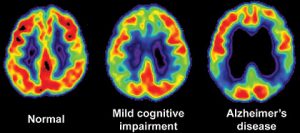 When an aging loved one starts getting forgetful, misplacing things or repeating questions, you might begin to wonder if this could be an indication of Alzheimer’s disease or dementia. It is possible that these lapses are simply a normal part of aging or possibly signs of a mild cognitive impairment unrelated to Alzheimer’s disease or dementia. If these behaviors are a concern to you or your loved one, it is important to speak with your doctor in order to get an accurate diagnosis.
When an aging loved one starts getting forgetful, misplacing things or repeating questions, you might begin to wonder if this could be an indication of Alzheimer’s disease or dementia. It is possible that these lapses are simply a normal part of aging or possibly signs of a mild cognitive impairment unrelated to Alzheimer’s disease or dementia. If these behaviors are a concern to you or your loved one, it is important to speak with your doctor in order to get an accurate diagnosis.
Alzheimer’s disease is progressive, meaning the symptoms get worse over time and the disease cannot be stopped or reversed. However, the rate of the disease progression does vary. Once Alzheimer’s has been diagnosed, patients typically live another 8 to 10 years and, in some cases, up to 20 years. An early diagnosis can help ensure good care and quality of life for a longer period of time.
Although the effects of Alzheimer’s can vary for different people, the symptoms of the disease generally follow a path from mild to moderate to severe. But even before any symptoms become apparent, changes can be occurring in the brain for years or decades. In this preclinical disease stage, even when there are no outward indications of cognitive decline, imaging technologies can detect brain changes that are characteristic of Alzheimer’s disease.
However, it is usually when mild symptoms begin to be noticed that most people are diagnosed. This is when both the patient and their loved ones become increasingly concerned about cognitive changes which include memory or thinking difficulties, and these difficulties start to impact daily life. Typical mild symptoms during this phase might include forgetting recent events or repeating a question over and over, difficulty with financial decisions or problem solving, misplacing belongings or getting lost, struggling to find the right word to communicate or express a thought. It is possible that these changes are the result of a mild cognitive impairment that is not related to Alzheimer’s. A full evaluation from a qualified doctor will help determine if this is the case.
When mild impairment from Alzheimer’s advances to the moderate stage, additional and more pronounced changes begin to manifest, including increasing forgetfulness and confusion. Patients may begin having confusion about time, dates and seasons. They may forget where they are or start wandering to seek familiar surroundings. They might not recognize family or friends or mistake strangers for family. And they will begin needing more assistance with daily tasks such as getting dressed, grooming and self-care. Some behavioral changes may also intensify such as increasing sleeplessness or agitation at night, drowsiness during the day or depression and withdrawal.
When Alzheimer’s becomes severe, there can be a serious decline in both mental and physical functioning. The patient may not be able to communicate or speak coherently. They may eventually need complete full-time assistance with all personal care functions including eating, cleaning and using the bathroom. They may have increasing difficulty with motor abilities, gradually becoming unable to walk or sit up or eat.
While there is currently no treatment for the disease, some medications and other therapies can help relieve symptoms and extend opportunities for prolonged quality of life. It is important for both patients and caregivers to understand the stages of Alzheimer’s and the progression of symptoms to know what to expect as the condition advances and to help plan for the best care possible.
